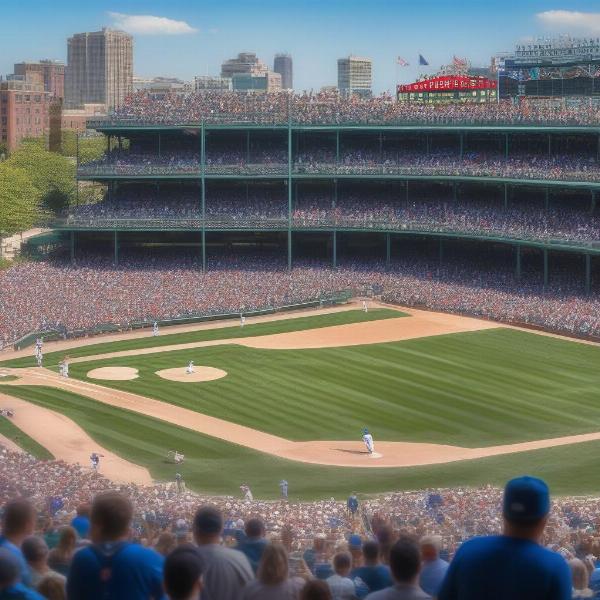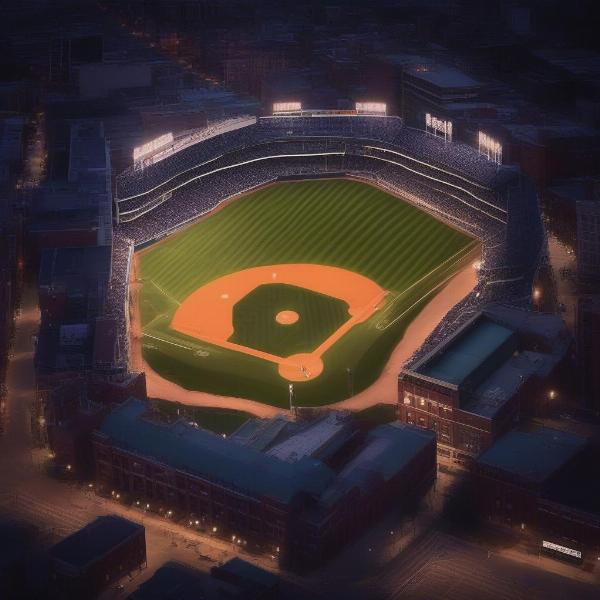The Chicago Cubs are known for their iconic home, Wrigley Field, and a unique characteristic: a heavy schedule of day games. Why Do The Cubs Play Day Games, particularly when other Major League Baseball teams often opt for evenings? The answer lies in a combination of history, tradition, neighborhood relations, and a dash of good old-fashioned baseball romanticism.
The Historical Roots of Cubs Day Games
Wrigley Field, originally known as Weeghman Park, opened in 1914. At the time, baseball stadiums largely lacked lighting for night games. This wasn’t a technological limitation, but rather a conscious choice. Baseball was seen as a daytime activity, a family affair meant to be enjoyed under the sun. This sentiment, combined with the lack of lights, solidified the Cubs’ day game tradition in the early years.
The Neighborhood’s Impact on Wrigley Field’s Lighting
The surrounding residential neighborhood of Wrigleyville also played a significant role in keeping the Cubs’ schedule bathed in sunlight. Residents were concerned about the noise, traffic, and potential disturbances that night games could bring. This led to strong community opposition to installing lights at Wrigley Field for many years. The Cubs, sensitive to their neighbors’ concerns, maintained their day game schedule. This solidified the team’s unique identity and further cemented the connection between the Cubs and the community.
 Wrigley Field Day Game Atmosphere
Wrigley Field Day Game Atmosphere
The “Charm” of Day Baseball and the Cubs’ Brand
The day game tradition also became intertwined with the Cubs’ brand and the romanticism of baseball. The image of ivy-covered walls bathed in sunshine, the friendly confines of Wrigley Field, and the day game atmosphere became a cherished aspect of the Cubs experience. It set them apart, creating a distinct identity in a league where night games were becoming the norm. This “charm” of day baseball was marketed and celebrated, becoming a core element of the Cubs’ appeal.
The Arrival of Lights and the Shift in Scheduling
Despite the long-standing tradition, lights finally arrived at Wrigley Field in 1988. This marked a significant shift in the Cubs’ scheduling. While day games remained a staple, night games were introduced, allowing for more television broadcasts and accommodating fans who couldn’t attend during the day. However, the number of night games at Wrigley Field is still limited compared to other ballparks, a testament to the enduring legacy of day baseball on the North Side of Chicago.
 Wrigley Field Illuminated for a Night Game
Wrigley Field Illuminated for a Night Game
Why Do Cubs Still Play More Day Games Than Other Teams?
Even with lights, the Cubs continue to play a higher percentage of day games than other teams. This is partly due to the continuing consideration for the Wrigleyville neighborhood, with restrictions on the number of permitted night games. Additionally, the Cubs organization recognizes the value of their day game tradition, understanding that it’s a part of their identity and continues to attract fans. The team’s broadcast agreements allow for lucrative national television contracts, despite the prevalence of day games.
Navigating Television, Revenue, and the Day Game Dilemma
The Cubs’ day game schedule does present challenges, particularly regarding television revenue. Primetime night games generally draw larger television audiences, translating to higher advertising revenue. However, the Cubs have successfully navigated this issue by leveraging their unique status and the appeal of Wrigley Field to secure lucrative television contracts despite having fewer night games. They prove a strong brand and dedicated fan base can overcome the typical revenue concerns tied to daytime broadcasts.
The Future of Cubs Day Games: A Balance of Tradition and Modernity
The future of Cubs day games likely involves a continuing balancing act. The team will likely strive to maintain the tradition while also adapting to the demands of modern baseball and broadcasting. This may mean a slight increase in night games over time, but the Cubs’ identity is so closely tied to day baseball that it will likely remain a significant part of their schedule for years to come.
“The Cubs and Wrigley Field day games are synonymous. It’s part of the magic, part of the history. You can’t separate the two,” says baseball historian Dr. Amelia “Milly” Thompson, author of “Wrigleyville: A Century of Cubs and Community.”
“Day games at Wrigley are a different experience. It’s a more relaxed atmosphere, a true celebration of the sport,” adds former Cubs pitcher, Ryan “Ryno” O’Malley, reflecting on his playing days.
Maintaining the Day Game Tradition: A Look Ahead
The Cubs organization understands the value and importance of their day game tradition. They are committed to finding ways to balance the demands of modern baseball with the unique heritage of Wrigley Field and the desires of the Wrigleyville community. The future will likely see adjustments and modifications, but the essence of Cubs day baseball appears destined to endure.
Do you think the Cubs should play more night games? Share your thoughts in the comments below!
Related Topics: Wrigley Field History, Chicago Cubs Traditions, MLB Scheduling, Day Baseball in MLB
Conclusion: The Sunshine Stays at Wrigley
Why do the Cubs play day games? The answer is a complex interplay of history, community, and tradition. From the early days of Weeghman Park to the modern era of Wrigley Field, day games have been a defining characteristic of the Cubs experience. While night games have become more common, the Cubs have successfully maintained a connection to their day game heritage, ensuring that sunshine baseball remains a vital part of the team’s identity, and a draw for fans who cherish the unique charm of a daytime game at Wrigley Field.
FAQ
-
Why are there fewer night games at Wrigley Field? The limited number of night games is partly due to agreements with the Wrigleyville neighborhood and a desire to maintain the day game tradition.
-
When were lights installed at Wrigley Field? Lights were installed at Wrigley Field in 1988.
-
Do the Cubs play any night games at all? Yes, the Cubs do play night games, but fewer than most other MLB teams.
-
What are the benefits of Cubs day games? Day games contribute to the unique atmosphere and tradition of Wrigley Field, attracting fans who enjoy daytime baseball.
-
Do Cubs day games impact television revenue? While primetime night games generally generate more television revenue, the Cubs have secured strong television contracts despite the prevalence of day games.
-
What is the future of Cubs day games? The Cubs will likely continue to balance tradition with modern baseball demands, suggesting that day games will remain a significant part of their schedule.
-
Why is Wrigley Field so special for day games? The combination of ivy-covered walls, sunshine, and the neighborhood setting creates a distinct and cherished daytime baseball experience.

